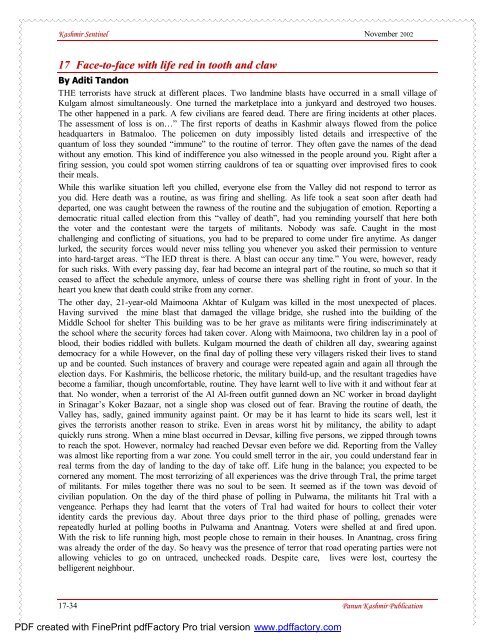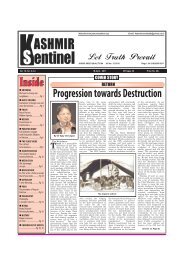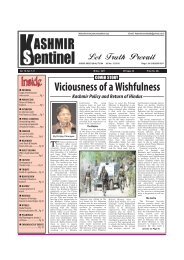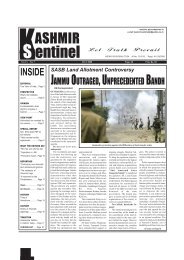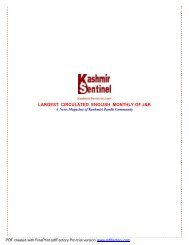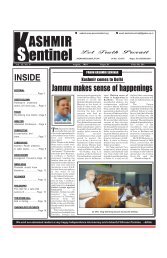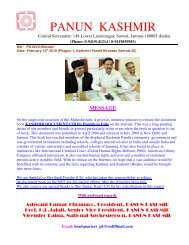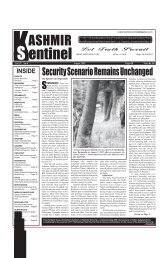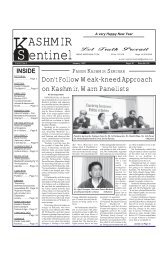Create successful ePaper yourself
Turn your PDF publications into a flip-book with our unique Google optimized e-Paper software.
<strong>Kashmir</strong> Sentinel <strong>November</strong> 200217 Face-to-face with life red in tooth and clawBy Aditi TandonTHE terrorists have struck at different places. Two landmine blasts have occurred in a small village ofKulgam almost simultaneously. One turned the marketplace into a junkyard and destroyed two houses.The other happened in a park. A few civilians are feared dead. There are firing incidents at other places.The assessment of loss is on…” The first reports of deaths in <strong>Kashmir</strong> always flowed from the policeheadquarters in Batmaloo. The policemen on duty impossibly listed details and irrespective of thequantum of loss they sounded “immune” to the routine of terror. They often gave the names of the deadwithout any emotion. This kind of indifference you also witnessed in the people around you. Right after afiring session, you could spot women stirring cauldrons of tea or squatting over improvised fires to cooktheir meals.While this warlike situation left you chilled, everyone else from the Valley did not respond to terror asyou did. Here death was a routine, as was firing and shelling. As life took a seat soon after death haddeparted, one was caught between the rawness of the routine and the subjugation of emotion. Reporting ademocratic ritual called election from this “valley of death”, had you reminding yourself that here boththe voter and the contestant were the targets of militants. Nobody was safe. Caught in the mostchallenging and conflicting of situations, you had to be prepared to come under fire anytime. As dangerlurked, the security forces would never miss telling you whenever you asked their permission to ventureinto hard-target areas. “The IED threat is there. A blast can occur any time.” You were, however, readyfor such risks. With every passing day, fear had become an integral part of the routine, so much so that itceased to affect the schedule anymore, unless of course there was shelling right in front of your. In theheart you knew that death could strike from any corner.The other day, 21-year-old Maimoona Akhtar of Kulgam was killed in the most unexpected of places.Having survived the mine blast that damaged the village bridge, she rushed into the building of theMiddle School for shelter This building was to be her grave as militants were firing indiscriminately atthe school where the security forces had taken cover. Along with Maimoona, two children lay in a pool ofblood, their bodies riddled with bullets. Kulgam mourned the death of children all day, swearing againstdemocracy for a while However, on the final day of polling these very villagers risked their lives to standup and be counted. Such instances of bravery and courage were repeated again and again all through theelection days. For <strong>Kashmir</strong>is, the bellicose rhetoric, the military build-up, and the resultant tragedies havebecome a familiar, though uncomfortable, routine. They have learnt well to live with it and without fear atthat. No wonder, when a terrorist of the Al Al-freen outfit gunned down an NC worker in broad daylightin Srinagar’s Koker Bazaar, not a single shop was closed out of fear. Braving the routine of death, theValley has, sadly, gained immunity against paint. Or may be it has learnt to hide its scars well, lest itgives the terrorists another reason to strike. Even in areas worst hit by militancy, the ability to adaptquickly runs strong. When a mine blast occurred in Devsar, killing five persons, we zipped through townsto reach the spot. However, normalcy had reached Devsar even before we did. Reporting from the Valleywas almost like reporting from a war zone. You could smell terror in the air, you could understand fear inreal terms from the day of landing to the day of take off. Life hung in the balance; you expected to becornered any moment. The most terrorizing of all experiences was the drive through Tral, the prime targetof militants. For miles together there was no soul to be seen. It seemed as if the town was devoid ofcivilian population. On the day of the third phase of polling in Pulwama, the militants hit Tral with avengeance. Perhaps they had learnt that the voters of Tral had waited for hours to collect their voteridentity cards the previous day. About three days prior to the third phase of polling, grenades wererepeatedly hurled at polling booths in Pulwama and Anantnag. Voters were shelled at and fired upon.With the risk to life running high, most people chose to remain in their houses. In Anantnag, cross firingwas already the order of the day. So heavy was the presence of terror that road operating parties were notallowing vehicles to go on untraced, unchecked roads. Despite care, lives were lost, courtesy thebelligerent neighbour.17-34 <strong>Panun</strong> <strong>Kashmir</strong> PublicationPDF created with FinePrint pdfFactory Pro trial version www.pdffactory.com


